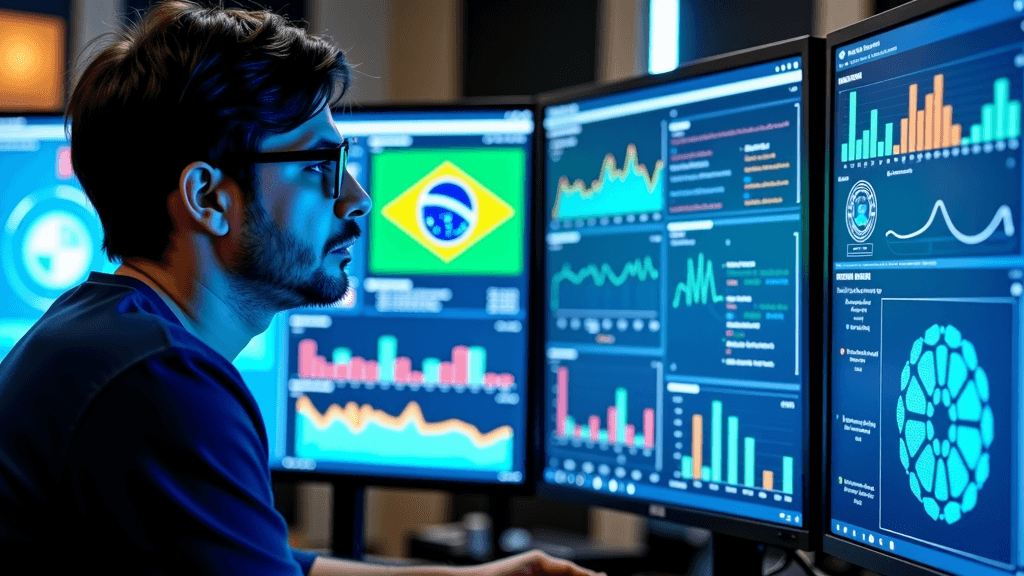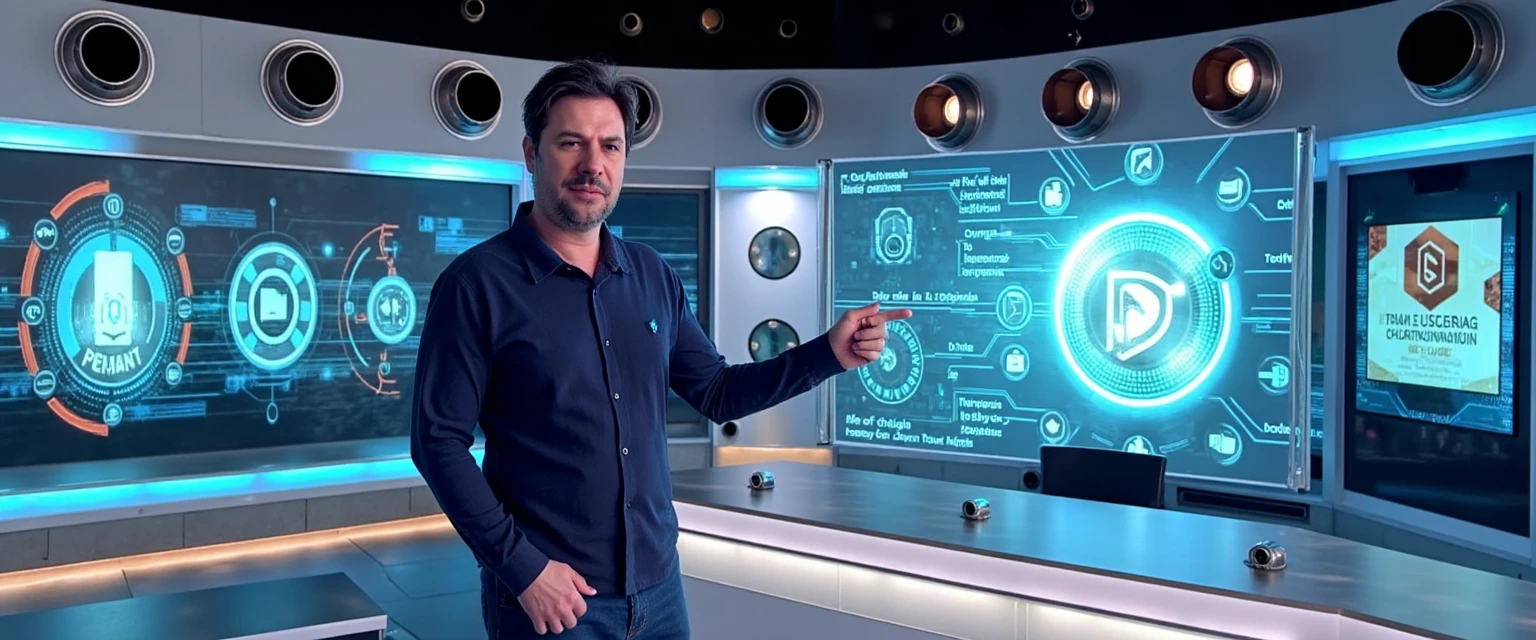AI-nomics: The New Economic Era of Artificial Intelligence and Who Will Thrive
March 19, 2025 | by Matos AI

We are living at the dawn of a new economic era driven by Artificial Intelligence. The Latin American AI market is expected to reach an impressive US$17.4 billion by 2027, according to IDC projections cited in recent Lenovo study. More than a technological breakthrough, we are witnessing a fundamental change in the way organizations generate value and position themselves competitively. Welcome to the era of AI-nomics.
The Birth of AI-nomics: When Technology Becomes a Business Outcome
Over the years of working with startups and innovation, I’ve observed a consistent pattern: breakthrough technologies only generate real value when they translate into tangible business outcomes. AI is following this exact path, moving from the promise phase to the delivery phase.
The concept of AI-nomics perfectly captures this transition: companies are moving away from focusing solely on developing technology to prioritizing the economic results it can provide. It's no longer about having AI, but about what AI can do for your business.
Join my WhatsApp groups! Daily updates with the most relevant news in the AI world and a vibrant community!
- AI for Business: focused on business and strategy.
- AI Builders: with a more technical and hands-on approach.
The projections are impressive: 50% of technology investments by 2025 will be directed to generative AI. The race is on, and whoever can align AI with business strategy will come out ahead.
The New Development Corridor: Between the US and China
While we debate adoption, global giants are locked in a geopolitical battle for AI supremacy. On one side, Nvidia just announced the Vera Rubin, your new superchip which promises to deliver 3.3 times the performance of the Blackwell Ultra. On the other hand, China is moving quickly with DeepSeek, which became the most downloaded AI app in the US after its launch.
The result? Americans are reacting with restrictive measures against Chinese technology, repeating the strategy used against TikTok. At the same time, after DeepSeek CEO Liang Wenfeng shook hands with President Xi Jinping, the company's technology became a state order and began to be adopted in Chinese courts and hospitals.
This geopolitical dispute shapes not only technological development, but also the global economic landscape of AI. For us in Brazil, understanding this dynamic is essential to position our companies and our innovation ecosystem in the international context.
The Four Pillars of AI-nomics: What Really Matters
Based on IDC’s CIO Playbook 2025 study, and combined with my experience of more than two decades in the innovation ecosystem, I have identified four essential factors for success in the AI economy:
- People: AI does not replace human capital, but it does require new skills. Organizations need to invest in training and attracting talent with the right skills to work with these technologies.
- Legacy systems integration: Modernizing existing infrastructure is a recurring challenge. Efficiently integrating AI into existing systems is a critical success factor.
- Data quality: Without reliable data, there is no efficient AI. Data structuring and governance have become strategic competencies.
- Governance: Establishing clear guidelines for the ethical and responsible use of AI is critical to mitigating risk and ensuring regulatory compliance.
As I have observed in my work with startups and accelerator programs, those who can harmonize these four pillars unlock the true transformative potential of AI.
The Other Side of the Coin: The Impacts of AI on the Job Market
The rise of AI-nomics brings with it profound transformations in the world of work. An alarming fact: One in four programming jobs in the US have disappeared in the past two years. It is the biggest drop ever recorded in this sector, which ironically was seen as a safe haven in the digital economy.
Interestingly, learning to code has been presented as the great path to professional salvation for millions of people, but today there are fewer programmers in the US than at any time since 1980. Are we repeating the same mistake in Brazil, focusing only on technical skills that can be automated?
In my talks about the future of work, I have been advocating for the concept of CACACA – an acronym for the six essential skills for professionals in the AI era: Creativity, Autonomy, Collaboration, Adaptability, Connection and Affection. These are precisely the human skills that complement AI, rather than compete with it.
Democratization vs. Centralization: The AI Paradox
As the discussion about the future of work progresses, we observe an interesting phenomenon in the development of AI tools: the democratization of access. Research shows that 75% of small and medium-sized businesses plan to adopt AI solutions by the end of 2025, and platforms such as Wix, Shopify and WordPress already integrate virtual assistants to automate website creation.
This creates an interesting paradox: on the one hand, AI technology is becoming more accessible to small entrepreneurs and companies; on the other, the infrastructure that powers this technology (AI chips, data centers, language models) is increasingly concentrated in a few giant companies.
In my work with startups, I have encouraged entrepreneurs to find specific niches where they can create value with AI, even without directly competing with the giants. Specialization and domain knowledge are the big differentiators in this scenario.
AI in Healthcare: When Algorithms Save Lives
One of the most promising fields for the application of AI is healthcare. Chinese researchers have developed a tool capable of predicting with 82.2% accuracy the risk of liver cancer recurrence — the third leading cause of cancer in the world, with a postoperative recurrence rate of up to 70%.
Called Times, this system uses AI to quantify the spatial distribution patterns of immune cells within the tumor. It is a powerful example of how technology can transform areas critical to human well-being.
In Brazil, we have enormous potential to develop AI applications in healthcare, especially considering our challenges in accessing and distributing medical resources. During my work with startup acceleration, I have seen a growing number of healthtechs exploring this path, but we are still far from reaching our full potential.
The Urgency of a Balanced Regulatory Framework
With the rapid advancement of AI, creating a balanced regulatory framework becomes increasingly necessary. In a recent article, MP Reginaldo Lopes highlighted his participation in an event in Brussels on AI regulation, promoted by the European Community, where experts discussed the challenges and solutions adopted in Europe.
Brazil needs to move forward in this discussion, seeking a balance that protects rights and stimulates innovation. As a founding member of the Dínamo Association, I have always argued that the best regulatory path is one that protects without suffocating, that establishes clear guidelines without impeding experimentation.
The Digital Services Act and the European Digital Markets Act provide important references for the distribution of responsibilities between companies and consumers, seeking to prevent abuses without compromising the freedom of creation and innovation.
Human Creativity vs. AI: The Battle for Copyright
Another topic that has gained relevance is the impact of AI on copyright. Hundreds of Hollywood stars asked in an open letter that the White House protect film, TV and music rights from tech and AI giants.
The document, signed by about 400 artists and directors, is a response to big companies that argue that their AI models should be allowed to be trained on a wide range of copyrighted works, arguing that they would fall behind their Chinese competitors otherwise.
This debate reflects a fundamental tension: how do we balance technological advancement with protecting human creativity? The answers we find to this question will shape not only the future of the arts, but also the development of the entire AI industry.
Brazil in the Era of AI-nomics: Opportunities and Challenges
Brazil has a unique opportunity right now. According to research by Google in partnership with Ipsos mentioned in the article about AI and website creation, 54% of Brazilians used generative AI in 2024, above the global average of 48%. In addition, 65% of Brazilian respondents are confident about the possibilities of AI, surpassing the global average of 57%.
This data shows that, despite our structural challenges, we have a population that is open and receptive to new technologies. This characteristic can be an important competitive advantage.
In my career supporting more than 10,000 startups, I have seen significant growth in AI-focused ventures in Brazil. The challenge now is to transform this entrepreneurial energy into globally competitive companies that not only adopt existing technologies, but also develop original solutions to local and global problems.
How to Position Yourself in the Era of AI-nomics: A Practical Guide
To conclude, I would like to share some practical recommendations for entrepreneurs, managers and professionals who want to thrive in the era of AI-nomics:
- Focus on results, not technology: AI should be a means to achieve business goals, not an end in itself.
- Invest in data before investing in AI: Without a solid data strategy, your AI will just be another cost with no return.
- Develop CACACA skills: Creativity, Autonomy, Collaboration, Adaptability, Connection and Affection are the skills that complement AI, not compete with it.
- Look for specific niches: Specialization and domain knowledge are the big differentiators in the world of AI.
- Prioritize user experience: AI should make people's lives easier and more enjoyable, not more complicated.
- Be aware of ethical and regulatory issues: Get ahead of discussions on privacy, bias, and algorithmic transparency.
- Build strategic alliances: Few companies will have all the resources needed to develop complete AI solutions. Partnerships will be essential.
In these rapidly changing times, I often remind myself of what I learned working with startups: adaptability is just as important as strategic vision. In my mentoring work with entrepreneurs, I have emphasized the importance of keeping an eye on the long-term horizon, but with the flexibility to adjust course as the landscape evolves.
The era of AI-nomics has only just begun, and those who can combine technological vision with a focus on business outcomes will be best positioned to capitalize on the opportunities that will arise. I am optimistic about Brazil’s potential in this new scenario, as long as we can align public policies, private investment and talent development in a coherent long-term strategy.
In my practice as a startup mentor and innovation consultant, I’ve helped companies navigate this transition by identifying specific opportunities in their industries and building internal capabilities to harness the potential of AI. If you’re looking for guidance on positioning your business for the era of AI-nomics, get in touch to discuss how I can support your journey.
✨Did you like it? You can sign up to receive 10K Digital's newsletters in your email, curated by me, with the best content about AI and business.
➡️ Join the 10K Community here
RELATED POSTS
View all



